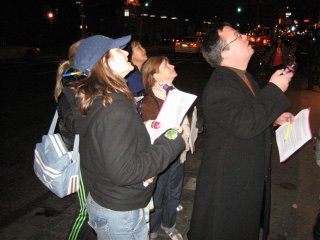
Afterward, we went to the Coffee Shop for dinner. I always thought the place was just a diner with outdoor seating. It turns out they have an actual bar (or two) inside and a very cool restaurant area hidden away in back. Among other things, we discussed the sad state of affairs at our beloved Fifth Avenue Presbyterian Church. An allegedly cuckolded husband has sued not only our married senior pastor (who allegedly began a four-year affair with a parishioner while counseling the parishioner and her husband on how to work out the problems in their marriage), but also the church and the presbytery. Considering that the senior pastor doubtless had confidentiality obligations regarding the counseling itself, and that he and the parishioner allegedly denied (until this spring) whatever was going on between them, it is unlikely that "the church" knew. And if the church didn't know, it is difficult to imagine how the presbytery -- which is much further removed from the situation -- could possibly know. The alleged faithlessness is despicable -- but we are not talking about failure to recognize a pedophile here, we are talking about two religiously sophisticated, church-going adults who apparently chose or allowed themselves to break some promises (and a commandment) they no longer considered convenient. On January 17, 1999, the senior pastor gave a sermon entitled "Is Morality a Public or Private Matter?" His answer to that damns him here, if the allegations are true. It does not damn the church or the presbytery. I simply cannot see why the allegedly cuckolded husband should enrich himself at the expense of the church.
On a lighter note: I saw a bluejay on my window sill this morning -- just four feet away from me, at eye level. Maybe I will have to buy a digital camera after all.






